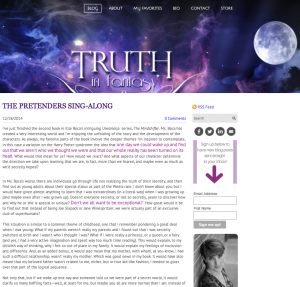In December 18, 2014, after reading Unelmoija: The Mindreader, Anne Marvin, who writes her opinions about fantasy fiction at TruthinFantasy.com, was inspired to write a post. In it, she explores some of the ideas from the book, especially the concept of Weeia as superhumans living hidden among humans.
I especially appreciated her words of praise about Unelmoija: The Mindreader: “Ms. Boca has created a very interesting world and I’m enjoying the unfolding of the story and the development of the characters.” Thank you, Anne!
With her permission here’s a copy:
Click to enlarge
The Pretenders Sing-Along
I’ve just finished the second book in Elle Boca’s intriguing Unelmoija series, The Mindshifter. Ms. Boca has created a very interesting world and I’m enjoying the unfolding of the story and the development of the characters. As always, my favorite parts of the book involve the deeper themes I’m inspired to contemplate, in this case a variation on the Harry Potter syndrome: the idea that one day we could wake up and find out that we aren’t who we thought we were and that our whole reality has been turned on its head. What would that mean for us? How would we react? And what aspects of our character determine the direction we take upon learning that we are, in fact, more than we feared, and maybe even as much as we’d secretly hoped?
In Ms. Boca’s world, there are individuals go through life not realizing the truth of their identity, and then find out as young adults about their special status as part of the Weeia race. I don’t know about you, but I would have given almost anything to learn that I was extraordinary (in a literal way) when I was growing up (and maybe even after I was grown up). Doesn’t everyone secretly, or not so secretly, yearn to discover how and why he or she is special or unique? Don’t we all want to be exceptional? How great would it be to find out that instead of being Joe Sixpack or Jane Winespritzer, we were actually part of an exclusive club of superhumans?
This situation is similar to a common theme of childhood, one that I remember pondering a great deal when I was young: What if my parents weren’t really my parents and I found out that I was secretly switched at birth and I wasn’t who I thought I was? What if I were really a princess, or a queen, or a fairy (and yes, I had a very active imagination and spent way too much time reading). This would explain, to my childish way of thinking, why I felt so out of place in my family. It would explain my feelings of exclusion and difference. And, as an added bonus, it would also mean that my mother, with whom, as you know, I had such a difficult relationship, wasn’t really my mother. Which was good news in my book. It would have also meant that my beloved father wasn’t related to me, either, but in true kid-like fashion, I tended to gloss over that part of the logical sequence.
Not only that, but if we woke up one day and someone told us we were part of a secret world, it would clarify so many baffling facts—well, at least for me, but maybe you all are more normal than I am. Instead of feeling like a freak or someone who sees life from the outside in, as I did for so many years, especially from my early teens into my late twenties, I could think of myself as part of an ultra-covert, super cool, in-crowd of people like me who I didn’t even know about, but with whom I now belonged.
And if that were true, then I would also be able to validate my secretly-nurtured, barely acknowledged and rarely shared conviction that I really am singular and extraordinary and worthy. That all the rejection and dejection I’ve experienced was just the necessary tempering of the metal to make it stronger before it emerges into the world ready to fulfill its function. Wouldn’t that be something?
And as I write this I realize anew how much I used to yearn for the kind of legitimization that anonymous Weeia in Ms. Boca’s world received upon learning of their previously unknown heritage in the Unelmoija world. I so wanted something or someone outside of myself to tell me that I was more than I feared I was. But here is where truth and fantasy diverge. Beyond the fact that no one in the real world is going to tell us that we are members of a secret race of superhumans (beyond White Supremacists, or other misguided haters, of course), we don’t, in fact, need that to happen.
We are all special and unique and valuable. By virtue of being garden-variety humans, rather than a superhumans, we are part of the club, a member of the in-group. We all get to participate in the privileges and responsibilities of being human. Just plain human. That we don’t feel this way is a tragedy of epic proportions, generated by incompetent parenting as well as the constant comparisons we make about ourselves while being forced to watch artificially enhanced people pretend to be perfect on TV, in the movies and on social media. Sadly, as we strive for a perfection that doesn’t exist in reality, we enter a vicious cycle of inadequacy and self-hatred, leading back to our secret desire to get a letter from Hogwarts telling us that our lives to date have been just the warm up—that the real thing is starting soon, and it will be so much more, so much better than what we have.
Don’t believe it. It isn’t true. Because I’m special. So special. Just ask Chrissie Hynde.
To read the original post go to: http://www.truthinfantasy.com/blog/the-pretenders-sing-along



Recent Comments